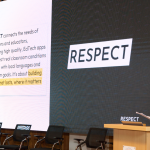November 9, 2020
Today’s young people must be the most analysed, tracked and monitored of any generation, ever.

Schools record their attendance, absences, the results of every test and assessment, as well as their family circumstances because, in the UK at least, this might attract some additional government funding for the school.
This issue was raised at a recent event organised by EDUCATE Ventures, the company for which I work, and which will begin to collaborate with start-ups creating educational technology using artificial intelligence and other emerging technologies, in the new year. In a series of webinars on AI-readiness aimed at educators and businesses, which took place during the Covid-19 lockdown, participants learned of the potential of AI in the teaching and learning process.
During one of these webinars, hosted by our director Professor Rose Luckin, in discussion with Karine George, an educational consultant and former head teacher, it was suggested that children needed to be brought into discussions about their privacy, data and information collection from a young age. Ms George said this was important because the data “is part of their history and will follow them around”.
“If you want to create good citizens of the future then you need to not just to get consent from the parents [when collecting data about pupils] but to talk to children about their consent,” Ms George said.
“They need to have a voice. Currently we do not give children the opportunity, or talk to them, about it in the right way. We must develop the language around it, so that they understand what it means.
“This has frightened my generation. Mention GDPR in schools and everyone cringes. But if we start the conversations early, we can remove many of those anxieties.”
Ms George said children needed to be taught, and to understand, the ethics around technologies such as AI and data collection, which allow teachers to “use them as part of our armoury to help with their learning”.
She elaborated on the form these conversations might take. Discussions with children might include debates, games and role play. For example, a teacher might ask pupils to think of something that is really important to them, such as a favourite possession – like a soft toy or a bike – and then explain how they would feel about lending this to a friend.
“So, if another person borrows their favourite toy, they will need to know who has borrowed it and to acknowledge that they were happy to hand it over,” she said. “A teacher might ask pupils to consider how long they would be happy for someone to keep it, and would they allow someone else to borrow it, in turn.
“If they wanted to complain about how the lending arrangements had worked out, for example if the toy had been returned broken, the teacher would discuss with them to whom they might turn and what questions they would need to ask to resolve any problems.”
Professor Luckin said that there was so much data now collected and stored about children in school that “it is important they understand what that means in terms of how it is processed and used for their benefit”.
The discussion reminded me of an incident that occurred on the first day of the new academic year three years ago, when I had an unexpected discussion on privacy with my own child. For readers who are not in the UK, there is a tradition here that children are photographed outside their house on their first day back at school, and these photos are shared readily on social media such as Facebook and Instagram.
Except on this occasion, my daughter – then aged 7 – was adamant that while I could take the photo, I was not to post it anywhere.
I asked her why. She replied that she had recently watched a programme about online safety and the message was that parents should ask permission to share their children’s photos and information publicly.
As adults, and parents, we are all aware of the potential risks of compromising our children’s privacy by posting their photos on social media, but we still do it. Some people seem to play out their entire lives on Facebook. We do this partly because everyone else does. I found it a convenient way of sharing photos with family members scattered around the world – but did it really need to be done so publicly?
While my child’s decision might partly have been an act of defiance against this annual tradition, the programme had clearly also empowered her to say “no” when it was about violating her own privacy. Her expectation was that her decision was to be respected.
Now, three years on, I ask what I can and cannot share about her, publicly and it is a conversation that remains ongoing. As she grows into adulthood, she will increasingly have control over what the world sees of her life if she chooses to register and own her own social media accounts.
Our family experience meant that Karine George’s words resonated very strongly. Discussing, debating and challenging these issues early on empowers children to take control over their data and what they want to share. It makes them think about the personal profile and image they are creating of themselves, and the implications of this following them around throughout their lives.
In today’s world, that is surely a good thing.










0 Comments